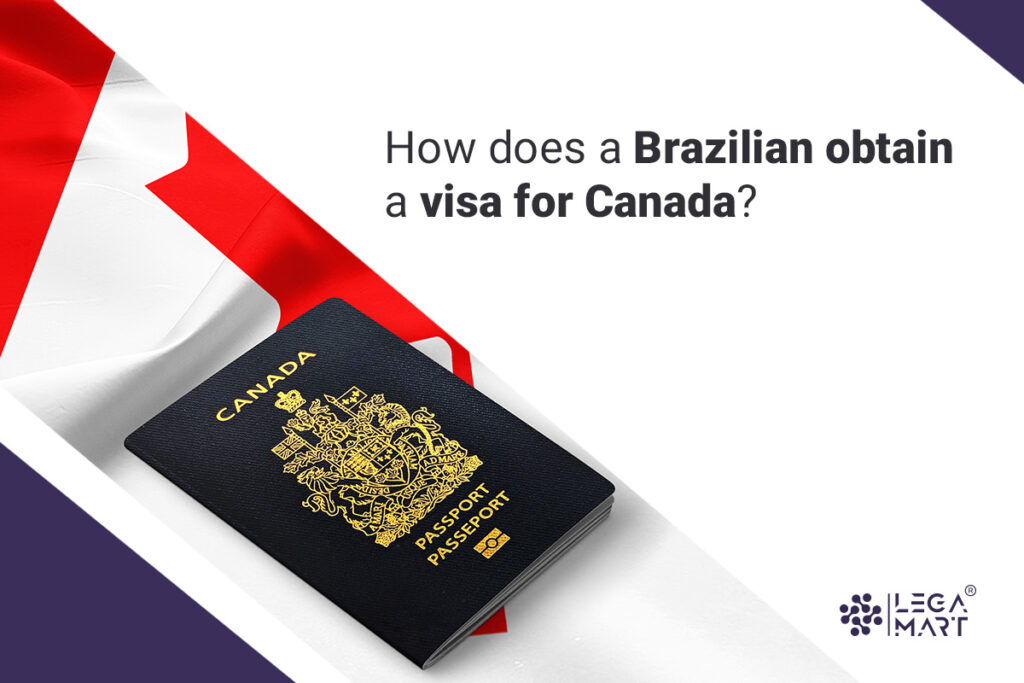Introduction
The promotion of democracy, human rights, and environmental stewardship are just a few of the shared values and interests between Brazil and Canada. They are also significant business partners.
Brazil has historically attracted immigrants to Canada for various reasons, including the opportunity to study, find employment, and improve their standard of living.
Skilled people seeking to fill vacant posts in Canada have recently flocked to Canada via immigration from Brazil.
While many Brazilians emigrated to Canada for work or business, others did so under the sponsorship of a family member or for humanitarian causes. Therefore, it is crucial to have a good knowledge of the Canadian immigration system, its prerequisites, programs, visas, and the application procedure for obtaining permanent residency in Canada. This article will review the many sorts of visas Brazilians can get for Canada and the application procedure.
Options for Brazilian to obtain a visa for Canada
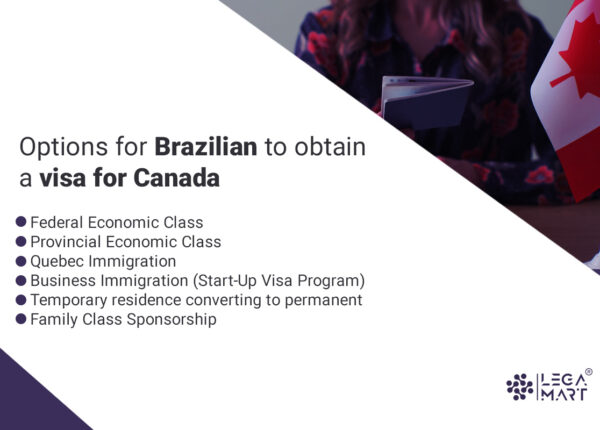
Brazilian citizens seeking a visa to Canada have several options to explore, each catering to different circumstances and purposes. Here are the main avenues through which Brazilians can secure visas for Canada:
1. Federal Economic Class: This category encompasses immigration programs designed to welcome skilled workers, professionals, and businesspeople based on their ability to contribute to the Canadian economy. The Express Entry system is a key pathway within this class.
2. Provincial Economic Class: Canadian provinces and territories have their immigration programs tailored to meet specific regional needs. Applicants with skills and experience relevant to a particular province or territory may find opportunities through these programs.
3. Quebec Immigration: Quebec has a unique immigration system separate from the rest of Canada. The Quebec Skilled Worker Program (QSWP) and other streams provide avenues for skilled workers and professionals to settle in the province.
4. Business Immigration (Start-Up Visa Program): Entrepreneurs looking to establish a business in Canada may explore the Start-Up Visa Program. This initiative aims to attract innovative entrepreneurs who can contribute to the growth of the Canadian economy.
5. Temporary Residence Converting to Permanent: Some individuals may initially enter Canada on a temporary basis, such as through work permits or study permits. Over time, they may explore pathways to transition to permanent residency, leveraging their Canadian experience.
6. Family Class Sponsorship: Family reunification is a significant aspect of Canada’s immigration policy. Canadian citizens and permanent residents can sponsor close family members, facilitating their immigration to Canada under the Family Class Sponsorship program.
7. Temporary Visas (Tourist, Work, Study): Temporary visas, including tourist visas, work permits, and study permits, provide short-term options for Brazilians to visit, work, or study in Canada. These can be stepping stones for those considering long-term residency.
Navigating the Canadian immigration system requires a clear understanding of individual eligibility, program requirements, and the specific goals of the applicant. It’s advisable for Brazilians considering immigration to Canada to thoroughly research each option, possibly seeking professional guidance to ensure a smooth and successful application process.
Different Types of Canadian Visas for Brazilian Citizens
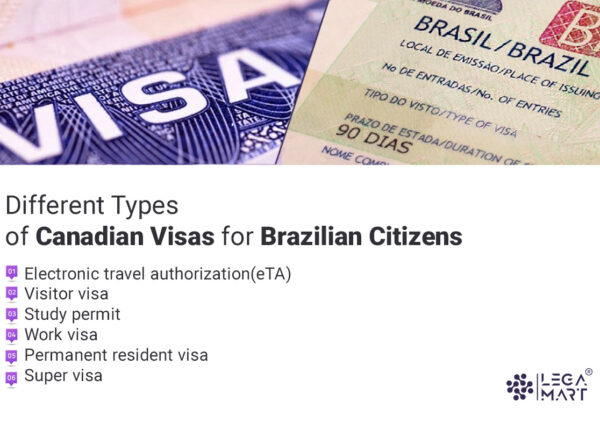
Electronic travel authorization(eTA)
Numerous Brazilians are eager to relocate to Canada on a visa. Prior to 2017, they were able to enter Canada with a visiting visa. As of May 1, 2017, citizens from Brazil are able to opt for an Electronic Travel Authorization (eTA) instead of a visitor visa when flying to or transiting through a Canadian airport.
However, Brazilian citizens who do not meet the eligibility criteria for an eTA or travel to Canada via car, bus, train, or boat/cruise ship will still require a visitor visa. Therefore, it is simpler for Brazilians to make last-minute trips to Canada. Strong diplomatic relations exist between the two nations. Thus the Brazilian government has been added to the list of 59 nations whose residents are eligible to apply for an eTA visa quickly.
Brazilians should follow the entry requirements and request an eTA before boarding a journey to Canada. eTA visa is granted quickly and is good for five years beginning the day it is given to the applicant. The candidate must either have a valid non-immigrant US visa or have held a Canadian visa within the last ten years. Brazilians require a separate visa, not an eTA, if they are heading to Canada by water or through the Southern US border. They must submit an application to the Brazilian consulate office or Canada’s embassy.
Documents and information needed for Brazilian citizens to apply for Canada eTA
To apply for Canada eTA, a Brazilian citizen will need the following documents; –
- A valid passport which should not expire within the next six months, starting from the date of arrival;
- A valid email address. This is because the application process is online, and successful eta visas are sent via email;
- Means of payment, i.e. American Express, MasterCard visa card, or Debit or Credit Card, e.t.c; and
- On February 22, 2021, the Canadian government introduced an additional requirement for Brazilian citizens and other eTA-eligible applicants, including a travel health certificate.
What is the application process for the Canada eTA Visa for Brazilian citizens?
The online application process for an eTA Canada Visa involves filling out forms on the eTA Canada Visa website with essential information, including passport details and contact information such as a valid email address. The applicant will then pay the application fees, and once the online credit card payment has been verified, the applicant will receive the eTA Canada Visa via email.
Visitor visa
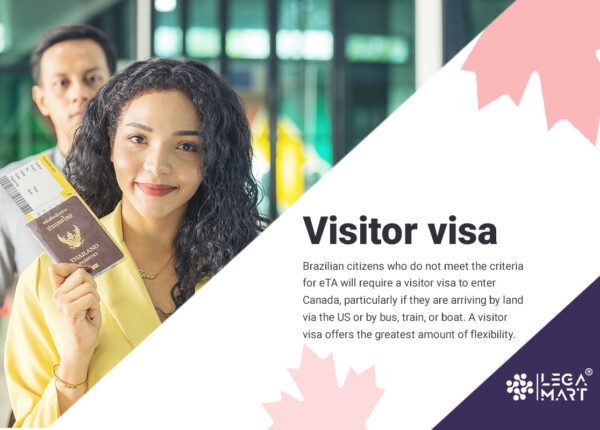
Brazilian citizens who do not meet the criteria for eTA will require a visitor visa to enter Canada, particularly if they are arriving by land via the US or by bus, train, or boat. A visitor visa offers the greatest amount of flexibility.
Eligibility requirements for Brazilian Citizens
To be eligible for a visitor visa, you must have the following; –
- Possess a valid travel document, such as a passport,
- Be in good health
- No prior criminal or immigration convictions.
- Ability to convince an immigration officer that you have sufficient ties, such as a job, home, financial assets, or family, in your home country to guarantee your return after your visit to Canada.
- Demonstrate to the immigration officer that you intend to leave Canada once your visit is complete.
- Have enough funds to support your stay in Canada, which will depend on the length of your stay and the type of accommodation.
How long can a Brazilian Citizen stay in Canada as a visitor?
The majority of visitors, including those from Brazil, are permitted to remain in Canada for a maximum of six months. In the event that you are granted entry into Canada, the border services officer may authorize a stay that is shorter or longer than six months.
- The border services officer will indicate the date you must depart on your passport.
- In the event that you do not receive a stamp in your passport, you are authorized to stay in Canada for up to six months from the day you arrive or until your passport expires, whichever comes first.
Study permit
There are numerous reputable universities in Canada, and Brazilian citizens can obtain a study permit to apply for a study visa there. The visa is valid for the length of your study plus an additional 90 days, during which you can look for work and apply for a work visa.
To be qualified to apply for a study permit, one must fulfil the following requirements:
- A letter of acceptance from a Designated Learning Institution (DLI) to submit an application for a study visa in Canada.
- Proof that you have enough money to cover the cost of living (housing, food, etc.) for you and any accompanying family members during your first year of study, in addition to the tuition for that year.
- All requests for research permits must be accompanied by a substantial amount of supporting evidence.
Work visa
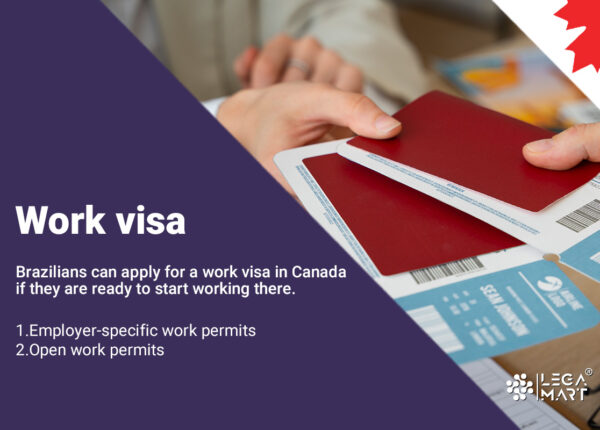
Brazilians can apply for a work visa in Canada if they are ready to start working there. There are two categories of work visas that Canada issues:
- Employer-specific work permits: These restrict the employee’s ability to work for only that one employer. Thus, if the employee decides to leave that job, his work visa will expire.
- Open work permits: This is awarded under specified circumstances, letting an individual work in Canada in any capacity.
Permanent resident visa
Brazilian citizens can apply for permanent residency in Canada through various immigration programs, including Express Entry System, a points-based system. The purpose of the Express Entry System is to assist skilled foreign workers and their families in obtaining permanent residency in Canada. This system is exclusively available to skilled workers and is divided into three programs:
Federal skilled worker program (FSWP)
This program targets individuals with the necessary qualifications, skills, or work experience to contribute to the Canadian economy.
To be eligible, a Brazilian citizen must have prior work experience in professional occupations (skill level A), managerial positions or skilled trades and technical jobs (skill level B). Besides, the applicant must achieve a minimum of 67 points on a points-based evaluation. Thus, if the applicant is accepted, they will receive Canadian permanent residency.
Federal skilled trades program (FSTP)
This program is intended for skilled foreign workers who have relevant work experience in eligible trade occupations and are interested in immigrating to Canada.
Canadian experience class (CEC)
The Canadian Experience Class (CEC) caters to individuals seeking permanent residency who have Canadian work experience that was acquired through a temporary work permit. As temporary foreign workers are usually well-established in Canadian society, with existing support networks, transitioning to permanent residency and, eventually, citizenship is a relatively smooth process.
A profile must be submitted as part of the Express Entry Process, and scores will be assigned based on the Comprehensive Ranking System, which considers variables like age, education, work experience, and language proficiency. The total points you receive from a job offer could increase significantly. The profile with the highest rating will be invited to apply to any of the programmes above.
Within a 60-day window, the applicant must submit a complete application that satisfies all conditions. Following receipt of the complete application, the final judgment will be rendered in about six months.
Super visa
The Super Visa is a temporary visa that allows Brazilian parents and grandparents of Canadian citizens or permanent residents to visit Canada for an extended period. With this visa, they can stay in Canada for up to five consecutive years from their initial entry without renewing their status. The Super Visa is a multi-entry visa, enabling multiple entries for up to 10 years.
Starting from July 4, 2022, Super Visa holders are eligible for a longer stay of up to five years if they apply on or after that date. However, if you entered Canada with a valid Super Visa before July 4 2022, the length of your authorized stay will remain the same, typically two years, as determined by the border services officer. However, if you wish to benefit from the extended stay, you will need to exit Canada before your authorised stay ends and re-enter the country after July 4, 2022.
Eligibility for Super Visa
- The applicant must be the parent or grandparent of a Canadian citizen or permanent resident of Canada.
- The applicant must have a signed letter from their child or grandchild inviting them to Canada. The letter must include a promise of financial support for the duration of the visit, a list of people residing in the household, and proof of Canadian citizenship or permanent resident document of the child or grandchild.
- The applicant must have medical insurance from a Canadian insurance company valid for at least one year from entry and provides coverage of at least $100,000.
- The applicant must provide proof that the medical insurance has been paid.
Fees associated with applying for a Canadian visa for Brazilians
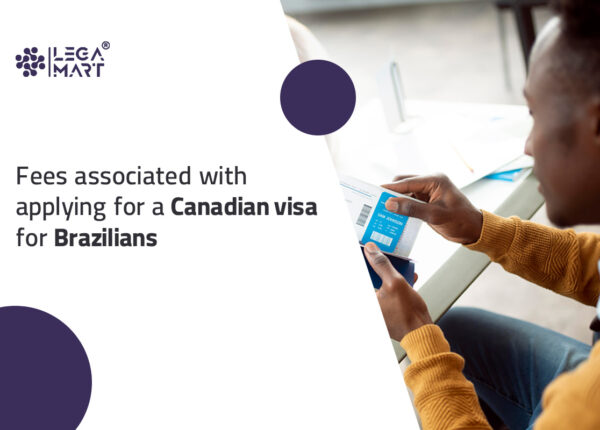
- If you are a citizen of Brazil and seeking a visa to Canada, you must pay a variety of visa fees. These categories include application and service costs for temporary and permanent residence, family sponsorship, citizenship, and other applications and services.
- A work permit costs $155 per person. A study permit costs $150 per person.
- eTA Request for a Travel Authorization $7 is the fee. The cost of biometrics is $85 per person.
- The cost of obtaining permanent residency is $490. $1050 is the processing charge. A permanent residence application will therefore cost a total of $1540.
- The processing charge for economic immigration applications is $550, and the application fee is $490. As a result, the total fees will be $1040.
- The fees for self-employed individuals, Quebec business immigrants, and start-up visas are applicable if you are seeking business immigration.
- The handling visa charge, which must be paid online when applying for a visa, is 49 euros.
Conclusion
If you are a citizen of Brazil and wish to apply for a Canadian visa, you must first select the group or programme for which you will be qualified before submitting your application together with the necessary paperwork and costs. If you are not approved under that technique, you must explore another alternative by consulting an experienced immigration lawyer.
Frequently Asked Questions (FAQs)
Can Brazilians travel to Canada without a visa?
In most cases, Brazilians require a visa to enter Canada. However, certain exceptions may apply, such as for those with diplomatic passports or those participating in specific programs.
What are the main types of visas for Brazilians travelling to Canada?
The primary types of visas include tourist visas, work visas, study visas, and family-sponsored visas. The appropriate visa depends on the purpose and duration of the stay.
How can Brazilians apply for a tourist visa to Canada?
Brazilians can apply for a tourist visa online through the Immigration, Refugees, and Citizenship Canada (IRCC) website. The application process involves submitting the required documents and paying the applicable fees.
Are there specific requirements for a Canadian work visa for Brazilians?
Yes, requirements vary based on the type of work visa. Generally, a job offer from a Canadian employer and, in some cases, a Labour Market Impact Assessment (LMIA) may be required.
Can Brazilians study in Canada, and how do they apply for a study visa?
Yes, Brazilians can study in Canada by applying for a study permit. The application process includes acceptance to a Canadian educational institution, proof of funds, and other supporting documents.
Is it possible for Brazilians to work while studying in Canada?
Yes, many study permit holders in Canada are eligible to work part-time during their studies and full-time during scheduled breaks. Certain conditions and restrictions apply.
Are there family-sponsored visas for Brazilians to join their relatives in Canada?
Yes, family-sponsored visas, such as spousal sponsorship or family reunification programs, allow Canadians or permanent residents to sponsor their eligible family members.
How long does it take to process a Canadian visa application for Brazilians?
Processing times vary depending on the type of visa and individual circumstances. Brazilians should check the current processing times on the official IRCC website.
Are there English or French language requirements for Canadian visas for Brazilians?
Language requirements depend on the visa type. For study or work visas, language proficiency may be required. Proof of language skills can be demonstrated through language tests.
How can Brazilians stay informed about updates to Canadian immigration policies?
The official website of Immigration, Refugees, and Citizenship Canada (IRCC) provides the latest information on visa requirements, application processes, and any policy changes. Regularly checking for updates is recommended.

